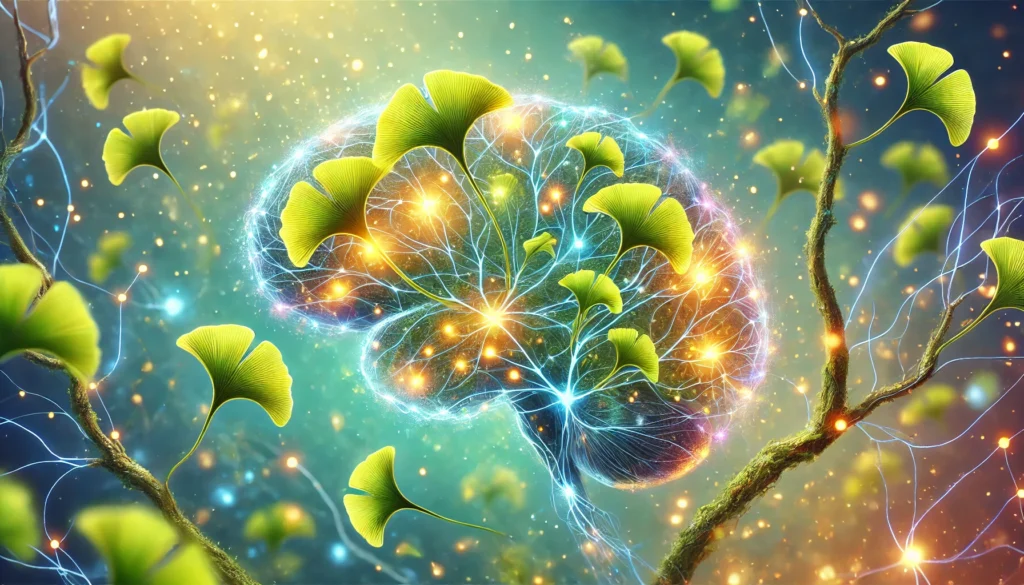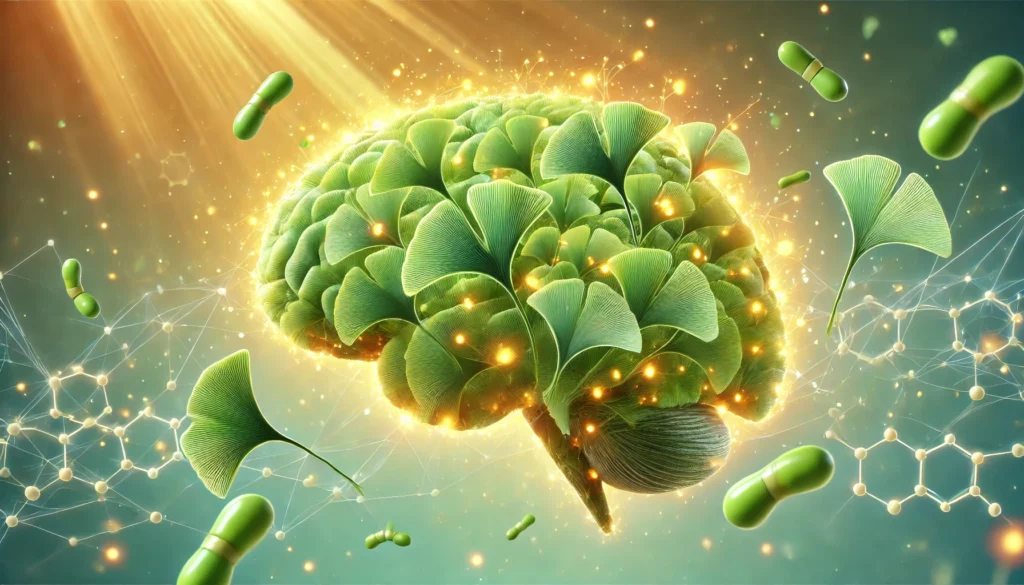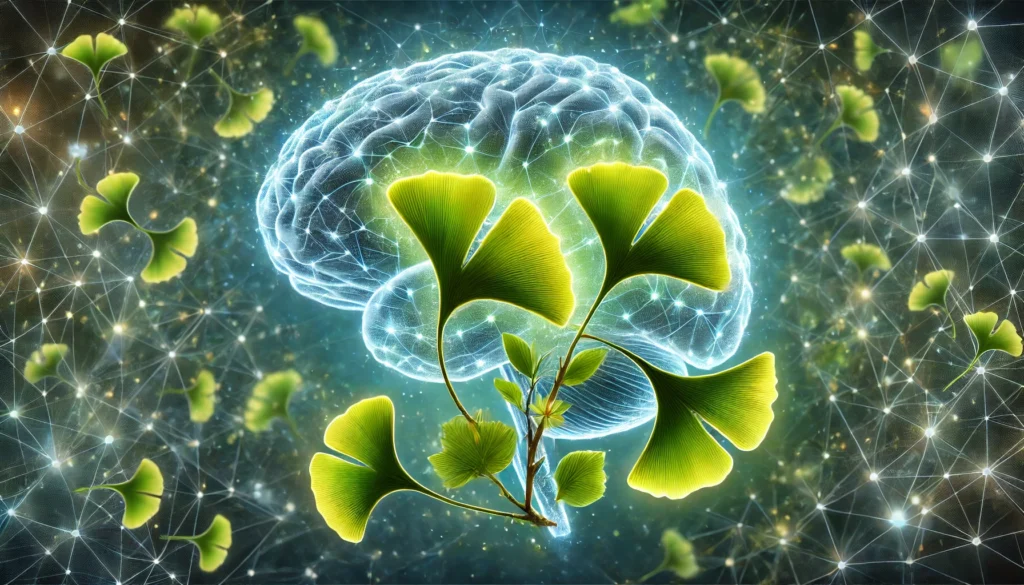Introduction
Ginkgo biloba, one of the oldest tree species in the world, has been used for centuries in traditional medicine to improve cognitive function, circulation, and overall brain health. As modern neuroscience advances, researchers have become increasingly interested in the connection between ginkgo biloba and dopamine, a crucial neurotransmitter that plays a significant role in motivation, pleasure, memory, and overall brain function. Understanding how ginkgo biloba influences dopamine production and regulation may provide valuable insights into its potential benefits for mental health, neurodegenerative diseases, and cognitive performance.
You may also like: The Best Adaptogens for ADHD: How Rhodiola Rosea May Improve Focus and Reduce Stress
In this article, we will explore the intricate relationship between ginkgo biloba and dopamine, examining scientific evidence, mechanisms of action, and potential benefits for brain health. We will also consider practical applications, dosages, and possible side effects to provide a comprehensive guide for those interested in leveraging ginkgo biloba for optimal cognitive function.
The Role of Dopamine in Brain Health
Dopamine is a vital neurotransmitter that influences numerous physiological and psychological functions. It plays a fundamental role in regulating mood, motivation, attention, and reward-driven behavior. An imbalance in dopamine levels can contribute to conditions such as depression, anxiety, Parkinson’s disease, and attention deficit hyperactivity disorder (ADHD).
The brain’s dopaminergic system is complex, involving multiple pathways that interact with various regions of the brain. The mesolimbic pathway, often referred to as the “reward pathway,” is crucial for reinforcing pleasurable experiences and motivating behavior. The nigrostriatal pathway, on the other hand, is responsible for regulating movement and coordination, making it particularly relevant in the study of Parkinson’s disease. Given dopamine’s extensive influence on brain function, researchers continue to investigate natural ways to support and optimize dopamine production, including through herbal supplementation such as ginkgo biloba.

How Ginkgo Biloba Influences Dopamine Levels
Several studies suggest that ginkgo biloba has a direct and indirect impact on dopamine production, release, and receptor sensitivity. This effect can be attributed to its rich composition of flavonoids, terpenoids, and other bioactive compounds that contribute to neuroprotection and neurotransmitter modulation.
Enhancing Dopamine Release
Research indicates that ginkgo biloba may enhance dopamine release by promoting better blood circulation and increasing oxygen supply to the brain. Dopaminergic neurons rely on sufficient oxygen and nutrient delivery to function effectively. Ginkgo’s vasodilatory properties help expand blood vessels, improving cerebral blood flow and ensuring that dopamine-producing neurons receive the necessary resources for optimal performance.
Protecting Dopaminergic Neurons
Oxidative stress is a significant contributor to neuronal damage and neurodegenerative diseases. Dopaminergic neurons are particularly susceptible to oxidative damage, which can lead to conditions such as Parkinson’s disease. Ginkgo biloba’s strong antioxidant properties help combat oxidative stress by neutralizing free radicals and reducing inflammation. By protecting these neurons from damage, ginkgo biloba may contribute to sustained dopamine levels and improved cognitive function over time.
Modulating Dopamine Receptor Sensitivity
Dopamine receptor sensitivity plays a crucial role in how effectively dopamine signals are transmitted throughout the brain. Some research suggests that ginkgo biloba can enhance dopamine receptor function, making the brain more responsive to existing dopamine levels. This may lead to improved mood, motivation, and cognitive clarity without necessarily increasing dopamine production beyond healthy levels.
Potential Cognitive Benefits of Ginkgo Biloba and Dopamine Regulation
The interplay between ginkgo biloba and dopamine presents several promising benefits for cognitive function and mental well-being. Below, we explore some of the key ways in which this botanical supplement may contribute to brain health.
Improving Memory and Learning
Dopamine plays a crucial role in memory consolidation and learning processes. Enhanced dopamine signaling, facilitated by ginkgo biloba, may lead to better retention of information and faster recall. Studies have shown that ginkgo supplementation improves working memory and cognitive flexibility, making it a popular choice for students and professionals seeking cognitive enhancement.
Supporting Mental Clarity and Focus
Attention and focus are largely governed by dopamine levels in the prefrontal cortex. By improving dopamine function, ginkgo biloba may enhance concentration and reduce symptoms of cognitive fatigue. This makes it particularly beneficial for individuals with ADHD or those experiencing age-related cognitive decline.
Alleviating Symptoms of Depression and Anxiety
Dopamine deficiency has been linked to mood disorders such as depression and anxiety. Ginkgo biloba’s ability to regulate dopamine levels, combined with its anti-inflammatory and antioxidant properties, may contribute to improved mood and emotional resilience. Clinical studies have suggested that ginkgo biloba supplementation can reduce symptoms of anxiety and depression, making it a natural alternative or complement to traditional treatments.
Potential Implications for Neurodegenerative Diseases
Neurodegenerative disorders such as Parkinson’s disease are characterized by the progressive loss of dopaminergic neurons. Ginkgo biloba’s neuroprotective effects may help slow the progression of such diseases by protecting remaining neurons and supporting dopamine production. While more research is needed to establish definitive therapeutic benefits, preliminary findings are promising.
Practical Considerations: Dosage, Usage, and Safety
For individuals interested in using ginkgo biloba to support dopamine function and brain health, understanding proper dosage and safety considerations is essential.
Recommended Dosage
The optimal dosage of ginkgo biloba varies depending on individual needs and health conditions. Most clinical studies suggest a dosage range of 120-240 mg per day, divided into two or three doses. Standardized extracts containing 24-32% flavonoids and 6-12% terpenoids are typically recommended for maximum efficacy.
Potential Side Effects and Precautions
While ginkgo biloba is generally well-tolerated, some individuals may experience mild side effects such as headaches, dizziness, gastrointestinal discomfort, or allergic reactions. Due to its blood-thinning properties, ginkgo should be used with caution by individuals taking anticoagulant medications or those with bleeding disorders.
Pregnant and breastfeeding women should consult a healthcare professional before using ginkgo biloba, as its effects during pregnancy and lactation have not been extensively studied.

Frequently Asked Questions: Ginkgo Biloba and Dopamine
1. How does ginkgo biloba support dopamine production in the brain?
Ginkgo biloba influences dopamine levels by improving cerebral blood flow, ensuring dopamine-producing neurons receive sufficient oxygen and nutrients. Additionally, its antioxidant properties help protect these neurons from oxidative stress, which can impair dopamine synthesis. Some studies suggest that ginkgo biloba may also increase dopamine receptor sensitivity, allowing for better neurotransmitter efficiency. By reducing neuroinflammation, ginkgo dopamine interactions may support cognitive resilience, particularly in aging populations. The combination of these effects makes ginkgo biloba a compelling natural supplement for individuals looking to optimize dopamine function for mental clarity and emotional well-being.
2. Can ginkgo biloba improve symptoms of dopamine-related disorders like Parkinson’s disease?
While ginkgo biloba is not a cure for Parkinson’s disease, its neuroprotective properties may offer some benefits to individuals managing the condition. Parkinson’s disease is characterized by the progressive loss of dopamine-producing neurons, leading to motor and cognitive impairments. Research suggests that ginkgo biloba’s ability to enhance dopamine signaling and combat oxidative damage may slow disease progression. Additionally, some studies indicate that ginkgo dopamine interactions could help improve mood and cognitive function in Parkinson’s patients. However, it is essential to consult a healthcare provider before using ginkgo biloba as part of a Parkinson’s disease management plan.
3. Is ginkgo biloba effective for boosting motivation and focus through dopamine enhancement?
Yes, ginkgo biloba’s impact on dopamine may contribute to improved motivation and concentration. Dopamine plays a crucial role in the brain’s reward system, influencing goal-directed behavior and cognitive drive. By increasing dopamine receptor efficiency, ginkgo biloba may enhance the brain’s ability to process rewards, making tasks feel more engaging and less tedious. Furthermore, the supplement’s effects on blood circulation and neuroprotection may improve overall cognitive endurance, allowing for sustained focus. Many individuals who use ginkgo biloba for cognitive enhancement report increased productivity and a greater sense of mental energy.
4. How does ginkgo biloba compare to pharmaceutical dopamine boosters?
Ginkgo biloba offers a natural alternative to pharmaceutical dopamine-enhancing drugs, but it works differently than medications like L-DOPA or stimulants. Pharmaceutical dopamine boosters typically increase dopamine synthesis directly or inhibit dopamine reuptake, leading to immediate effects. In contrast, ginkgo biloba supports dopamine function more gradually by improving neuronal health, blood flow, and receptor sensitivity. While it may not produce the rapid dopamine surge of prescription medications, ginkgo biloba’s long-term neuroprotective benefits make it a valuable supplement for sustained brain health. It is often used in combination with other cognitive enhancers for a well-rounded approach to dopamine support.
5. Can ginkgo biloba help with age-related dopamine decline?
Yes, ginkgo biloba may play a role in mitigating age-related dopamine decline. As individuals age, dopamine production naturally decreases, contributing to slower cognitive processing and reduced motivation. Ginkgo dopamine interactions may counteract these effects by enhancing circulation, reducing oxidative stress, and preserving neuronal function. Some studies have shown that elderly individuals who supplement with ginkgo biloba experience improvements in memory, mental clarity, and mood stability. Given its safety profile and potential benefits, ginkgo biloba is widely considered an excellent natural aid for maintaining cognitive vitality in older adults.
6. Does ginkgo biloba interact with other dopamine-boosting supplements or medications?
Ginkgo biloba may interact with certain dopamine-related supplements and medications, so caution is advised when combining them. For example, individuals taking prescription dopamine agonists, such as those used for Parkinson’s disease, should consult their doctor before using ginkgo biloba, as it may enhance or interfere with medication effects. Similarly, combining ginkgo biloba with stimulant medications or nootropic stacks that affect dopamine could lead to overstimulation or imbalances. While ginkgo dopamine effects are generally mild compared to pharmaceutical interventions, careful monitoring of dosage and overall neurotransmitter balance is recommended.
7. How long does it take to experience the dopamine-related benefits of ginkgo biloba?
Unlike synthetic dopamine enhancers, ginkgo biloba typically requires consistent use over weeks or months to produce noticeable effects. Most studies suggest that cognitive benefits, including dopamine-related improvements in motivation and focus, become evident after 4-6 weeks of regular supplementation. The gradual nature of ginkgo dopamine modulation is due to its neuroprotective and circulatory-enhancing mechanisms rather than direct dopamine stimulation. Some individuals may experience subtle changes within the first few weeks, such as increased mental clarity and alertness, while others may need more time for long-term benefits to manifest.
8. Can ginkgo biloba support mental health conditions associated with low dopamine?
Yes, ginkgo biloba may provide complementary support for mental health conditions linked to dopamine deficiencies, such as depression and ADHD. Low dopamine levels are often associated with lack of motivation, anhedonia, and difficulties with attention regulation. By improving dopamine receptor function and promoting better cerebral blood flow, ginkgo biloba may enhance mood and cognitive performance in individuals with these conditions. Some studies suggest that ginkgo biloba can help alleviate symptoms of mild depression and improve executive function in ADHD patients. However, it should not be used as a replacement for medical treatment without professional guidance.
9. What is the best way to take ginkgo biloba for dopamine-related benefits?
To maximize its dopamine-enhancing effects, ginkgo biloba should be taken in a standardized extract form containing 24-32% flavonoids and 6-12% terpenoids. The typical dosage for cognitive support ranges from 120-240 mg per day, divided into one or two doses. Taking ginkgo biloba with food may enhance absorption and reduce the likelihood of gastrointestinal discomfort. Some individuals stack ginkgo biloba with other nootropics, such as L-tyrosine or Rhodiola rosea, to create a synergistic dopamine-boosting effect. As with any supplement, consistency is key, and results may take time to develop.
10. Are there any lifestyle habits that can enhance ginkgo biloba’s effects on dopamine?
Yes, combining ginkgo biloba with other dopamine-supporting lifestyle habits can enhance its effectiveness. Regular exercise, particularly aerobic activities, has been shown to increase dopamine production and receptor sensitivity. A diet rich in tyrosine-containing foods, such as lean proteins, nuts, and dairy, can also support dopamine synthesis. Practicing mindfulness, engaging in rewarding activities, and maintaining a healthy sleep schedule further contribute to balanced dopamine levels. By integrating ginkgo biloba with these lifestyle choices, individuals can create a comprehensive approach to optimizing brain function and emotional well-being.

Conclusion
The relationship between ginkgo biloba and dopamine presents an exciting avenue for natural cognitive enhancement and mental well-being. By enhancing dopamine release, protecting dopaminergic neurons, and modulating receptor sensitivity, ginkgo biloba offers numerous benefits, including improved memory, focus, mood, and potential neuroprotection against age-related decline and neurodegenerative diseases.
As research continues to unfold, ginkgo biloba remains a promising botanical ally in the quest for optimal brain health. Whether used as a standalone supplement or as part of a broader cognitive wellness strategy, its impact on dopamine function makes it a valuable tool for anyone seeking to support their mental acuity naturally. However, as with any supplement, it is essential to use ginkgo biloba responsibly, adhering to recommended dosages and consulting healthcare professionals when necessary to ensure safety and effectiveness.
Further Reading:
12 Dopamine Supplements to Boost Your Mood
brain health, cognitive enhancement, neuroprotection, mental clarity, nootropic benefits, memory support, brain circulation, neurotransmitter balance, focus and concentration, natural supplements, herbal cognition boosters, dopamine regulation, mood support, cognitive aging, antioxidant brain support, natural brain boosters, mental performance, neurodegenerative prevention, dopamine pathways, herbal neuroenhancers
Important Note: The information contained in this article is for general informational purposes only, and should not be construed as health or medical advice, nor is it intended to diagnose, prevent, treat, or cure any disease or health condition. Before embarking on any diet, fitness regimen, or program of nutritional supplementation, it is advisable to consult your healthcare professional in order to determine its safety and probable efficacy in terms of your individual state of health.
Regarding Nutritional Supplements Or Other Non-Prescription Health Products: If any nutritional supplements or other non-prescription health products are mentioned in the foregoing article, any claims or statements made about them have not been evaluated by the U.S. Food and Drug Administration, and such nutritional supplements or other health products are not intended to diagnose, treat, cure, or prevent any disease.


